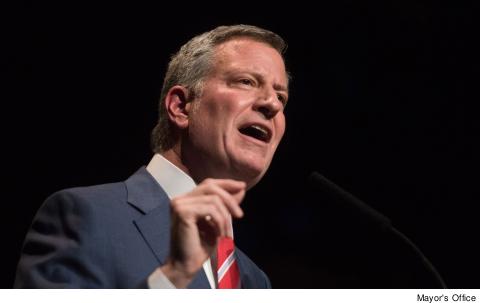After vigorous discussion, members of the PSC Delegate Assembly overwhelmingly endorsed Mayor Bill de Blasio for reelection on January 26. The DA voted on the endorsement at the recommendation of the union’s Executive Council and Legislation Committee.
 |
“Mayor de Blasio came into office promising to fight for universal pre-K, expand the paid sick leave law to cover thousands more workers, and raise the minimum wage for all city employees and contractors. He did that. He has also, with less public attention, increased funding for the City University of New York,” said PSC President Barbara Bowen in a statement.
She added, “There is still more to be done, and we will work with Mayor de Blasio to advance a progressive agenda for New York.”
SUPPORT FOR CUNY
The mayor has increased the city’s funding for CUNY every year since taking office in 2014. After meeting with PSC leaders during his first campaign for mayor, de Blasio changed his position on CUNY and promised to increase CUNY funding by $150 million over four years. With this year’s budget proposal, he is on track to keep that promise. The city has also expanded CUNY’s nationally celebrated Accelerated Study in Associate Program (ASAP), which has tripled graduation rates for participating community college students. With a commitment of tens of millions of dollars from the city under de Blasio’s tenure, the program will be able to serve 25,000 students annually. In the summer of 2014, de Blasio played a key role in finalizing the city’s support for adding eligible CUNY adjuncts to the NYC Health Benefits Program – the first addition of a major category of public employees in decades. Due to underfunding by CUNY, the previous adjunct health insurance plan faced an existential threat until PSC pressure led to cooperation with and, eventually, advocacy by CUNY management for additional funding from New York State. With funding from the state and critical support from the mayor, eligible adjuncts were shifted to the city’s health plan and ensured long-term stability.
AGAINST TRUMP
Since President Donald Trump, who ran on an anti-immigrant platform, took office, de Blasio has reaffirmed New York City’s status as a “sanctuary city” – a policy that means that local police will not detain undocumented immigrants on the federal government’s behalf for violating immigration law and committing minor offenses – even after President Trump issued an executive order in late January to punish sanctuary cities.
De Blasio spoke out against the order, saying at a January 26 press conference, “The stroke of a pen in Washington does not change the people of New York City or our values…The executive order will not change how we enforce the law in New York City, or how we do business on behalf of the people, all 8.5 million New Yorkers. This is a city of immigrants – we always have been for almost 400 years. This is our fundamental nature.”
Among de Blasio’s other first-term accomplishments is providing free full-day pre-K to every four-year-old in the city, expanding the city’s paid sick leave by requiring businesses with five or more employees to comply with the law, and pledging to raise the hourly minimum wage for all city government and contract employees to $15 an hour by the end of 2018.
VOICING CONCERNS
A few PSC delegates raised questions about the union’s support of the Democratic Party and about whether de Blasio had remained true to the progressive agenda he promised. Critics cited the modest financial settlements of union contracts during his term, the mayor’s track record on affordable housing, and – above all – his adherence to the “broken windows” approach to policing, which critics say unfairly target communities of color.
Several delegates spoke about the impact of policing policies on CUNY students. When the vote was taken, however, delegates overwhelmingly supported the endorsement of de Blasio. PSC officers pledged to work with the mayor for a second term to provide even greater support for CUNY, still desperately short of public funding.
THE RACE AHEAD
In the Democratic primaries, de Blasio may face several challengers, although no major opponents have yet declared candidacy. One who has declared is state senator and former city council member Tony Avella. Although Avella is a Democrat, he is a member of the Senate’s Independent Democratic Conference, which works with Republicans and has enabled Republican control of the State Senate.
Prominent among the contenders in the Republican primary is Paul Massey, a real estate executive who has outpaced de Blasio’s fundraising in the past six months, according to a January 17 article in The New York Times.
PSC was the first public sector union to endorse de Blasio in his first campaign for mayor in 2013. The PSC joins many other major unions endorsing de Blasio for his 2017 reelection bid, including the UFT, District Council 37, UNITE HERE Local 100, Service Employees International Union/32BJ, Associated Musicians of New York Local 802 and others.

